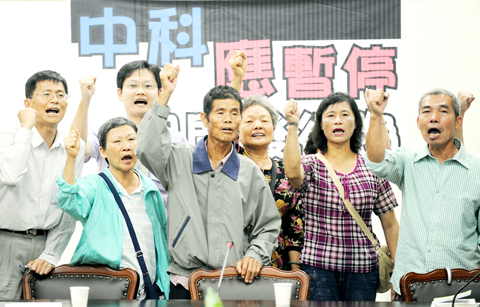Farming activists and environmentalists celebrated after the Taipei High Administrative Court yesterday ordered the Central Taiwan Science Park to halt all expansion activities pending a ruling on two ongoing lawsuits.
The science park’s two latest expansion projects — one in Taichung County’s Houli Township (后里) and the other in Changhua County’s Erlin Township (二林) — have sparked controversy in recent years as farmers oppose government expropriation of their farmlands to make way for the science park.
To stop the seizure of their farmlands in Siangsihliao (相思寮), Erlin, activists, environmentalists and local farmers filed three lawsuits with the administrative court — to void the science park’s construction permit for the Erlin project, to nullify the results of an environmental impact assessment, and to order the science park to stop all activities related to the expansion project until rulings on the two prior issues are handed down.

PHOTO: LO PEI-DER, TAIPEI TIMES
The court yesterday ruled in favor of the activists and suspended all expansion activities.
“The court ruling stressed a very important point,” Taiwan Rural Front spokeswoman Tsai Pei-hui (蔡培慧) told a news conference at the legislature. “It said ‘economic development and environmental protection are equally important.’”
“This is a very crucial ruling, and we’re now at a very crucial moment: From now on, economic development should no longer take precedence over the environment, as people used to think decades ago,” she said.
The court ruled that since the destruction of farmlands could cause irreversible damage, it was ordering a halt to construction.
Upon hearing the news, several Siangsihliao farmers rushed to Taipei to attend the press conference.
“We may be just illiterate farmers who are not very smart, but we’ve faithfully followed the whole legal process, and we hope the government will also abide by the court ruling,” farmer Chen Huang Yuan (陳黃媛) said.
Another Siangsihliao resident, Yang Yu-chou (楊玉洲), also urged the government to comply with the ruling and avoid wasting more taxpayers’ money on the controversial development project.
Although happy with the ruling, Thomas Chan (詹順貴), a member of the Taiwan Rural Front and a lawyer, voiced his worries that the government may try to twist it when interpreting the ruling.
“Of course the ruling is legally binding, and the project should be suspended right away even if the [science park] administration would like to appeal it,” Chan said. “But I’m still not very confident because of what happened to [the Houli project].”
Last year, the administrative court revoked the environmental impact assessment on the science park’s Houli expansion project. However, the Environmental Protection Administration (EPA) insisted that construction should continue, saying that since construction started based on a previously completed and valid environmental impact assessment result, it was not in violation of the Environmental Impact Assessment Act (環境影響評估法), which mandates that such development projects can only begin after completing an environmental impact assessment.
“I’m not sure what’s going to happen, but this is still something to celebrate,” Chan said.

INVESTIGATION: The case is the latest instance of a DPP figure being implicated in an espionage network accused of allegedly leaking information to Chinese intelligence Democratic Progressive Party (DPP) member Ho Jen-chieh (何仁傑) was detained and held incommunicado yesterday on suspicion of spying for China during his tenure as assistant to then-minister of foreign affairs Joseph Wu (吳釗燮). The Taipei District Prosecutors’ Office said Ho was implicated during its investigation into alleged spying activities by former Presidential Office consultant Wu Shang-yu (吳尚雨). Prosecutors said there is reason to believe Ho breached the National Security Act (國家安全法) by leaking classified Ministry of Foreign Affairs information to Chinese intelligence. Following interrogation, prosecutors petitioned the Taipei District Court to detain Ho, citing concerns over potential collusion or tampering of evidence. The

NEGOTIATIONS: Taiwan has good relations with Washington and the outlook for the negotiations looks promising, Minister of Economic Affairs J.W. Kuo said Taiwan’s GDP growth this year is expected to decrease by 0.43 to 1.61 percentage points due to the effects of US tariffs, National Development Council (NDC) Minister Paul Liu (劉鏡清) said at a meeting of the legislature’s Economics Committee in Taipei yesterday, citing a preliminary estimate by a private research institution. Taiwan’s economy would be significantly affected by the 32 percent “reciprocal” tariffs slapped by the US, which took effect yesterday, Liu said, adding that GDP growth could fall below 3 percent and potentially even dip below 2 percent to 1.53 percent this year. The council has commissioned another institution

NEGOTIATIONS: The US response to the countermeasures and plans Taiwan presented has been positive, including boosting procurement and investment, the president said Taiwan is included in the first group for trade negotiations with the US, President William Lai (賴清德) said yesterday, as he seeks to shield Taiwanese exporters from a 32 percent tariff. In Washington, US Trade Representative Jamieson Greer said in an interview on Fox News on Thursday that he would speak to his Taiwanese and Israeli counterparts yesterday about tariffs after holding a long discussion with the Vietnamese earlier. US President Donald Trump on Wednesday postponed punishing levies on multiple trade partners, including Taiwan, for three months after trillions of US dollars were wiped off global markets. He has maintained a 10 percent

TRADE: The premier pledged safeguards on ‘Made in Taiwan’ labeling, anti-dumping measures and stricter export controls to strengthen its position in trade talks Products labeled “made in Taiwan” must be genuinely made in Taiwan, Premier Cho Jung-tai (卓榮泰) said yesterday, vowing to enforce strict safeguards against “origin laundering” and initiate anti-dumping investigations to prevent China dumping its products in Taiwan. Cho made the remarks in a discussion session with representatives from industries in Kaohsiung. In response to the US government’s recent announcement of “reciprocal” tariffs on its trading partners, President William Lai (賴清德) and Cho last week began a series of consultations with industry leaders nationwide to gather feedback and address concerns. Taiwanese and US officials held a videoconference on Friday evening to discuss the